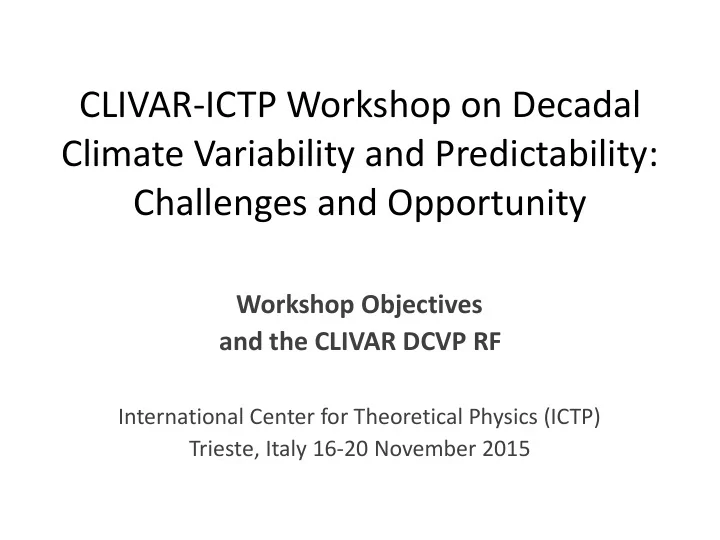

CLIVAR-ICTP Workshop on Decadal Climate Variability and Predictability: Challenges and Opportunity Workshop Objectives and the CLIVAR DCVP RF International Center for Theoretical Physics (ICTP) Trieste, Italy 16-20 November 2015
Decadal Climate Variability impacts on humans and the environment The core issue : The global and regional-scale expressions of the interaction between multi-year natural climate variations and anthropogenic climate change: Sahel droughts of 1970s & 1980s [AMOC/AMV + ENSO + Indian - Ocean SSTs + anthropogenic aerosols] Decadal variations in Atlantic TC activity [AMOC/AMV + ENSO + - GHGs] 1960’s-1990’s Mediterranean drying trend [NAO trend + AMV] - Southwest US multi-year droughts [PDV + AMOC/AMV + GHGs] - Recent ‘hiatus' – In the Pacific the east is cooling not warming and - the trades are intensifying [IPO/PDO (ocean heat uptake) + external forcing (stratospheric WV + volcanic aerosols + solar variability)] - Recent California drought [multi-year natural variability superimposed on a warming trend]. 2 CLIVAR-ICTP Workshop, Trieste Italy, 16-20 Nov. 2015
3 7 YK, US CLIVAR IAG mee0ng, Aug 2015 YK, US CLIVAR IAG mee0ng, Aug 2015 CLIVAR-ICTP Workshop, Trieste Italy, 16-20 Nov. 2015
Why DCVP research now? • New instrumental observations (particularly of the ocean and from space & recent advanced in modeling and in reanalysis. • CMIP5 experiments in initialized decadal prediction (and plans for continuation under CMIP6) indicate areas of success and frustration pointing at the need for more work on physical understanding. • The surprising “hiatus” and increase in damaging climate extremes invoke societal need for near-term knowledge for planning & preparedness. • Reconstructions of past climate variability from high-resolution single and multiple proxies provide new information on forced and free decadal variability during the pre-industrial era. • CMIP 5 simulations of the climate of last millennium: a study of the climate response to external forcing from solar variability, volcanic forcing, and changes in land use and contrast this response with the response to anthropogenic GHG emissions and aerosols. 4 CLIVAR-ICTP Workshop, Trieste Italy, 16-20 Nov. 2015
5 CLIVAR-ICTP Workshop, Trieste Italy, 16-20 Nov. 2015
CLIVAR DCVP Objectives • CLIVAR DCVP seeks to characterize the multi-year to multi-decadal variability of the climate system in response to internal processes and natural and anthropogenic forcing as well as their interaction • to determine and understand the phenomena, their governing mechanisms, and impacts through diagnostic analysis and modeling • to assess and subsequently harness the predictability of decadal climate variability for societal benefit. 6 CLIVAR-ICTP Workshop, Trieste Italy, 16-20 Nov. 2015
DCVP RF To advance CLIVAR DCVP objectives the Project sought to identify a limited number of research objectives that will be: Relevant & tractable and will benefit from international o collaboration. Cuts across other CLIVAR panels agenda and timely (preferably is o already in consideration or implementation). Leads to widely appealing, actionable research activity resolvable o within a finite time (~5 years) and yielding broad scientific and societal benefit. Community discussion yielded the following two foci that were endorsed by the SSG and are being developed further by the DCVP WG: 1. The decadal modulations – slowdowns and accelerations – of the long-term anthropogenic warming trend 2. The role of volcanic eruptions in decadal climate variability and their impact on decadal climate prediction 7 CLIVAR-ICTP Workshop, Trieste Italy, 16-20 Nov. 2015
TAS 1998 − 2002 minus 1981 − 1995 a Hiatus expressions: Reanalysis 60° N global mean vs. 30° N the spatial pattern Latitude 0° 30° S 120° E 180° 120° W 60° W 0° d Longitude Uninitialized 60° N 30° N Latitude The intensity of the scientific 0° 30° S Karl et al. (2015) 120° E 180° 120° W 60° W 0° the scientifjc gaps in our Longitude knowledge of the Hiatus Meehl et al. (2014) and − 0.6 − 0.5 − 0.4 − 0.3 − 0.2 − 0.1 0.0 0.1 0.2 0.3 0.4 0.5 0.6 suggest an integrated strategy 8 (°C) and coordinated effort towards FRONTIERS IN DECADAL CLIMATE VARIABILITY — September 3-4, 2015 improving observations, simulations, and predictions of the phenomena. In addition, many authors from this publication will be presenting on the warming hiatus topic during a special session at the upcoming 2015 US CLIVAR Summit on August 4 in Tucson, Arizona. US CLIVAR Project Office
Dynamical response to volcanic eruptions: Large inter-model & model-obs. disagreements Dynamical response averaged over first to large VEs, two winters after 20c volcanic eruptions. Top: Ts, bottom SLP. Note difference in color scale extent for obs. and models. Figure from Driscoll et al. (2012), 9 YK, US CLIVAR IAG meeting, Aug 2015
DCVP RF Working Group 10
DCVP RF Activities o Work with the WCRP/WGSIP Decadal Climate Prediction Project (DCPP) to establish protocols for CMIP6 decadal prediction activities. In particular: ▪ Pacemaker experiments for understanding mechanisms of climate shifts, internal modes of variability and predictability ▪ Perturbation experiments on the impact of volcanoes on predictability and predictions o Prepare the DCVP chapter in the new CLIVAR Science Plan; organize and convene a DCVP session in the CLIVAR Open Science Conference. o Assist in organizing the ICTP/CLIVAR International Workshop on Decadal Climate Variability and Predictability: Challenge and Opportunity, to be held on 16-20 November 2015, Trieste, Italy. o Update the CLIVAR DCVP science agenda and propose an implementation plan that lays out the path for rapid progress on the most pressing research objectives. 11 CLIVAR-ICTP Workshop, Trieste Italy, 16-20 Nov. 2015
CLIVAR-ICTP Workshop Objectives o Report on the outcomes of recent research on DCVP and discuss and share ideas inspired by these results o Identify the obstacles to progress in DCVP science and related pressing scientific issues, particularly those that require international attention and would benefit from enhanced international coordination o Identify existing and emerging opportunities for making rapid progress on these issues o Suggest new activities or initiatives that can foster such progress 12 CLIVAR-ICTP Workshop, Trieste Italy, 16-20 Nov. 2015
Recommend
More recommend